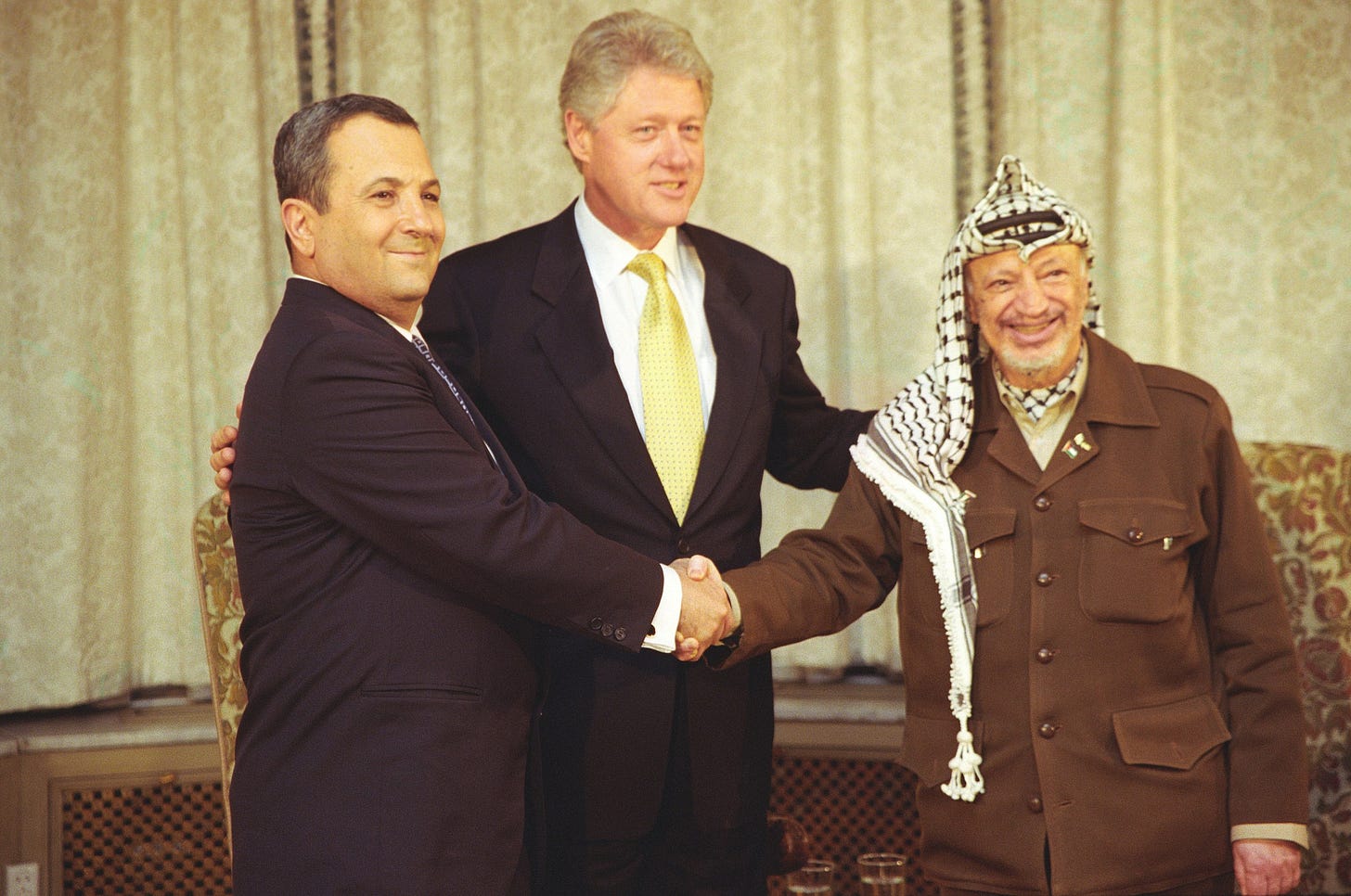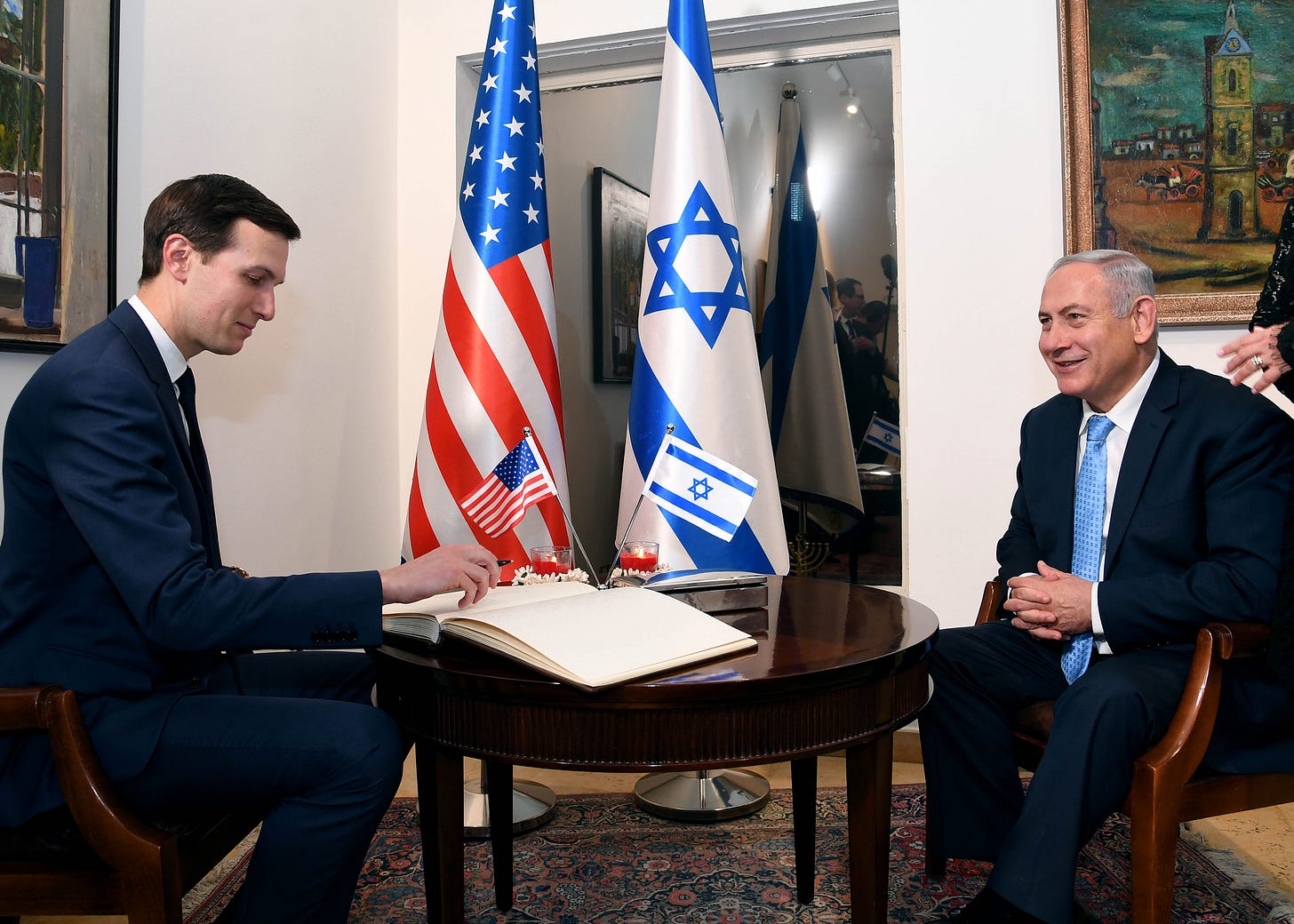The Ultimate Enemy of Israelis and Palestinians
"When we remove ego, we're left with what is real."
Please consider supporting our mission to help everyone better understand and become smarter about the Jewish world. A gift of any amount helps keep our platform free and zero-advertising for all.
You can also listen to the podcast version of this essay on Apple Podcasts, Google Podcasts, or Spotify.
If you ask Israelis why they don’t have peace with the Palestinians, they’ll tell you that the Palestinians are not a “real partner” for peace, that they won’t accept living next to a Jewish state, and that, even if the Palestinians get a state, they will use it to continuously attack Israel (as longtime Palestinian leader Yasser Arafat admitted in the 1990s, and more recently Hamas aspires to do).
If you ask Palestinians why they don’t have peace with the Israelis, they’ll tell you that Israel is a colonial-settler state which stole their parents’ and grandparents’ land, and that a “right of return” — obviously and justifiably a non-starter for Israel — must be part of any peace arrangement.
But what if the real enemy in the Israel-Palestinian conflict is not Israelis in the eyes of Palestinians, and Palestinians in the eyes of Israelis? What if the real enemy in one of the world’s longest-continuing sagas is that part of personality which has a pernicious tendency to elevate our self-importance? You know, the ego.
Allow me to explain.
The Israeli-Palestinian conflict can be explained, with great simplification, as such: Jews and Palestinians violently fought with each other throughout the 1800s and first half of the 1900s as more Jews (mostly legally) migrated to Ottoman-era and then British-era Palestine.
In 1948, Israel declared its independence, five Arab countries attacked the new Jewish state just hours later, and the first Israeli-Arab War broke out, or what the Palestinians call the “Nakba” (“catastrophe” in Arabic) since some 700,000 Palestinians became refugees.
As a result of Israel’s victory in this war, Palestinian identity was suppressed by neighboring Arab states who took in Palestinian refugees during the 1950s. The Palestine Liberation Organization (PLO), a terror group formed in 1964, became the de facto representative of the Palestinian people, with a charter calling the establishment of Israel illegal. It also sanctioned “armed resistance” (i.e. terrorism) in what the PLO saw as a struggle for liberation.
As such, the Palestinians unleashed all types of indiscriminate terror against Israel and Jews throughout the 1960s, 1970s, and 1980s, culminating in the First Intifada. (Intifada means “shaking off” in Arabic.) A political shift began in the late 1980s, and the Palestinian desire for statehood became one of their talking points.
Over the following years, with Israel and the PLO under pressure for different reasons, momentum built for the two sides to negotiate a resolution, and an opportunity for something unprecedented began to take shape: the first direct dialogue between Israel and the PLO, and what would become their most sustained effort to reach a settlement.
This was known as the Oslo Accords, named for the city where the secret talks took place. Fourteen sessions of discussions held over an eight-month period, all behind a thick veil of secrecy, led to one agreement in 1993 and another in 1995.
Some say the Olso peace process came as close as any negotiated process ever has to resolving this intractable conflict, but in the end, Oslo failed — perhaps because of ego, mainly from the West’s corner of the ring.
Jan Egeland was among four Norwegians involved in the Oslo Accords. As the country’s Deputy Foreign Minister, he provided political cover, facilities, and finances for the negotiations. Yet research into Egeland’s career shows that he might have been less interested in actual peace between Israel and the Palestinians, and more interested in adding this overinflated “accomplishment” to his résumé.
During Egeland’s tenure as Secretary General of the Norwegian Red Cross, trucks they donated to the African country Malawi were little more than scrap metal and thus totally useless, according to the Norwegian documentary, “De hvite hjelperne” (“The White Helpers”) — although Egeland and the Red Cross declared this operation a success.
Another documentary entitled “Sultbløffen” (“The Famine Scam”), about the Niger food crisis nearly 20 years ago, accused then-United Nations relief coordinator Egeland, along with several others, of bluffing and blowing the situation out of proportion.
In a recent interview, Egeland said the only viable way out of the current Israel-Hamas war is through international mediation, but international mediation — driven by ego-inflated diplomates and statesmen — is at least partly what landed Israel and the Palestinians in this mess to begin with.1
For Egeland, the Oslo Accords were another notch on his sociopolitical belt, but for Israel, the peace process was a trap that the Arabs and the Jew-haters among the Europeans deceitfully set for the Jewish state. Israeli concessions only encouraged Palestinian extremist elements, without receiving any tangible gestures in return. The IDF’s then-Chief of General Staff, Ehud Barak, famously remarked that the agreements had “more holes than Swiss cheese.”
To be sure, the Oslo Accords were not so much about realizing a peaceful vision as they were the product of “constructive ambiguity.”2 After decades of war, terrorism, and bloodshed, the Norwegian negotiators theorized the two sides could not be expected to immediately settle their primary disputes; an interim period of trust-building was needed. Thus, they thought it was best to remain ambiguous about the core issues and leave them unresolved, rather than force the sides to adopt positions and make concessions which they might not be ready to do.
“This constructive ambiguity, imbued in each element of the Accords, proved to be utterly destructive,” wrote Einat Wilf, a former left-leaning Israeli politician. “Instead of building trust and allowing the parties to adjust to the reality of the inevitable compromises which were necessary for peace, it merely allowed each side to persist in its own self-serving interpretation of what the Accords implied and to continue the very behavior which destroyed trust on the other side. And so, when the time came, a few short years later, to settle the core issues, the ensuing failure was all but inevitable.”
U.S. President Bill Clinton and his administration thought they could take a stab at the Israeli-Palestinian conflict, as well. During the 1990s, Clinton’s administration invited Arafat (a notorious terrorist) to the White House 13 times, more times than any other foreign visitor.
By then, Arafat, chairman of the PLO, was profusely corrupt, using public funds for his own purposes, which ranged from financing an expensive lifestyle in Paris for his wife, to buying and retaining the support of Palestinian politicians, to funding 13 so-called “security” organizations — which Israeli Prime Minister Ariel Sharon used to call “security-terror organizations.”
Since the signing of the Oslo Accords, the Palestinians had 12 governments. Each government had at least 24 ministers, totaling 228 ministers to “serve” a population of a couple million people. For comparison, Israel has 37 ministers for a country with nine million people.
But Clinton’s obsession with solving the Israeli-Palestinian conflict only encouraged even more Palestinian corruption, while signaling to the Palestinians who were disgusted with public corruption that the Americans were neither interested in nor planning to hold Arafat accountable.
By the end of Clinton’s eight years as U.S. president, he had nothing to show for it, a frustration he conveyed to Arafat after receiving a call from the Palestinian leader three days before the U.S. premier left office. “You are a great man,” Arafat said to Clinton. “The hell I am,” responded Clinton. “I’m a colossal failure, and you made me one.” In other words: Ego at its finest.

Then, at the end of 2016, U.S. Secretary of State John Kerry submitted a six-point plan for a final resolution to the Israeli-Palestinian conflict. Kerry’s declaration of principles followed the inherently antisemitic UN Security Council’s approval of Resolution 2334, which stated that Israel’s settlement activity in “Palestinian territories occupied since 1967, including East Jerusalem,” constitutes a “flagrant violation” of international law and has “no legal validity.” (Mind you, a 2022 poll of nearly 400,000 East Jerusalem Arabs found that half of them prefer to be citizens of Israel, compared to 42-percent who want the State of Palestine.)
According to Murray McCully, former Minister of Foreign Affairs for New Zealand, Resolution 2334 reinforced the international community’s commitment to a negotiated outcome, while former Canadian ambassador Paul Heinbecker noted that, Israeli and Palestinian narratives notwithstanding, Resolution 2334 “reflects what the world thinks.” But the world doesn’t have to live with the consequences of more failed “negotiated outcomes” — Israelis and Palestinians do.
The UN Security Council’s approval of Resolution 2334, which the U.S. could have vetoed but didn’t, led many in Israel to assume that U.S. President Barack Obama’s administration secretly orchestrated the resolution’s passage. After all, five years earlier during Obama’s first administration, the U.S. used its veto power to block a similar UN Security Council resolution.
It’s been postulated that Obama somehow recognized the historical prejudices suffered by Black Americans in the Palestinians’ plight — a common miscalculation among progressives who conflate all people’s suffering, wherever they are and no matter the context — as if the Palestinians were one-time slaves of the Jews who shipped them against their will across an ocean to provide Jewish capitalists with free labor. Perhaps Obama wanted to do for the Palestinians what he couldn’t politically accomplish for Black Americans, but I digress.
In any event, Kerry’s well-timed “contours for peace” felt like another iteration of the Oslo Accords — “constructive ambiguity” — such as the parameters “to find a mutually acceptable solution to Jerusalem as the internationally recognized capital of the two States, and to protect and secure freedom of access to religious sites.”
But there is no realistic “mutually acceptable solution to Jerusalem as the internationally recognized capital of the two States.” Because there is no other country in the world that would agree (or be expected) to share its capital with another country. Only egomaniacs would force onto others what they would not accept themselves.
During Donald Trump’s U.S. presidency, we saw more of the same ego-mindedness. Trump appointed Jared Kushner, a real estate developer who married his daughter Ivanka, to oversee U.S. policy on Israel and the Palestinians, even though he had no experience in international affairs.
A lack of experience in diplomacy is not necessarily a weakness in trying to forge a peace agreement — and could be an asset compared to those with experienced cynicism and historical biases. George Mitchell, for instance, was relatively unexperienced in Northern Ireland before playing a crucial role as the U.S. envoy in building peace.
But Kushner’s appointment raised eyebrows because it appeared to be based on little more than who he married. “I think Jared has a real conviction that he’s the Frank Sinatra of the peace process,” said Aaron David Miller, who spent years as a peace negotiator for previous U.S. administrations.3
Kushner and his compadres treated the Israeli-Palestinian conflict like a business deal since they came from entrepreneurial backgrounds. Kushner told the Israeli and Palestinians to “not talk to me about history” — a head-scratching attitude to a conflict and region steeped in history.
With economic incentives, Kushner and his team hoped to convince a Palestinian side that has historically prioritized issues of principle, such as the right of refugees to return to their homes, or to call Jerusalem their capital. Trump also saw negotiations as transactional, saying he had to force the Palestinians to reach an agreement by weakening their hand through aid cuts, while using Jerusalem as a bargaining “chip” taken away from the Palestinians.
To be fair, the Trump administration succeeded to legitimize the Jewish state across the Middle East, in what was known as the Abraham Accords, bilateral agreements between Israel and the United Arab Emirates and Bahrain. Morocco and Sudan were later added to the mix.
With regard to the Palestinians, Aaron David Miller met with Kushner a handful of times and said the president’s son-in-law has indeed made the Israeli-Palestinian conflict worse. He concluded that the process was not being driven by a desire for a negotiated settlement so much as to bolster the prospects of Benjamin Netanyahu’s reelection as Israeli prime minister in 2020 — because that would help Trump’s prospects of holding onto the White House.
But Joe Biden defeated Trump in 2020, overturning and superseding many of his policies. However, Biden seemed to sense that the Abraham Accords were successful and aimed to double-down on them by defiantly including Saudi Arabia.
When Saudi Crown Prince Mohammed bin Salman sat down on September 20th for his first English-language television interview, he indicated that prospects for a deal to normalize relations between Saudi Arabia and Israel were on track.
Leaks to media outlets that outlined parameters of the three-way talks related to defense, energy, and civilian nuclear power added to the sense that Saudi, Israeli, and American officials were persevering for a breakthrough that the Saudi Arabian Crown Prince asserted would be “the biggest historical deal since the end of the Cold War.”
Largely absent from the stream of material released into the public domain was any meaningful consideration of Palestinian interests, which at times appeared to be seen more as a concession in the tri-party efforts to reach an equilibrium, which would allow Saudi and Israeli officials to effectively “sell” any deal domestically and regionally.
Some have hypothesized that Hamas, sensing Israeli-Saudi normalization could neutralize the Palestinians’ cards in hand, attacked Israel on October 7th to kill or at least significantly stall whatever Israeli-Saudi progress had been made. I’m not suggesting that the U.S. is to blame for the current Israel-Hamas war, but the Biden administration trying to “one up” Trump’s accomplishments in time for another Biden-Trump presidential showdown in 2024 may have precipitated the timing of Hamas’ plans.
All these examples show that ego is the actual Israeli-Palestinian enemy. And make no mistake: Israelis and Palestinians are also guilty of allowing ego to dictate their diction and actions in dealing with and, at times, avoiding the realities of this conflict.
“When we remove ego, we’re left with what is real,” said international bestselling author Ryan Holiday.
It seems to me that what is real in the Israeli-Palestinian conflict, at least for now, is the fact that practical, implementable solutions just do not exist. There are only responses and policies (e.g. deterrence, defunding) which seem slightly more, or slightly less, likely to reduce suffering and keep each party at a safe distance.
Long ago, many Israelis (particularly political centrists and right-wingers) realized that there are no real solutions to the Israeli-Palestinian conflict, but much of the world keeps harping about a two-state solution, most recently after Hamas’ October 7th terror attacks, as if giving the Palestinians a state is some “reward” for the pure evil that Palestinian terrorists inflicted in Israel that day.
This is part of a larger Western drawback in which, rather than listening to others and being open-minded about different perspectives and approaches, the West and its institutions are always in “Mr. Fix It” mode — a mode that imposes Western thought and practice on non-Western parts of the world. A mode thus manifested by exceptionalism. By ego.
This pressing need to solve every problem on Earth is part of Western culture’s obsession with “happy endings” and “peace on Earth” — but neither microcosm of wishful thinking has any connection with reality, not today and not ever. It’s time we accept that some situations won’t end happily, and “peace on Earth” only makes for a cute mug or bumper sticker.
One American academic, Alan Richards, said it more aptly: The West is largely comprised of “Puritan Engineers” who believe all problems have solutions, the past and history don’t matter (as Jared Kushner explicitly said), and “our new technology, and our organizational prowess, will always find a solution.”4
Hence, the Israeli-Palestinian paradox: The more we try to devise a solution, the less likely we are to actually achieve one.
“Key Israeli-Palestinian accord dead, says an architect of deal.” Bangkok Post.
“The Fatal Flaw That Doomed the Oslo Accords.” The Atlantic.
“‘Don’t talk about history’: how Jared Kushner crafted his Middle East ‘peace’ plan.” The Guardian.
“American Thinking About Violence in the Middle East.” UC Santa Cruz: Center for Global, International and Regional Studies.




Josh, you speak uncomfortable truths. Your ability to see through platitudes and recognize previously unaddressed issues could be a key to some sort of arrangement, if only those in positions of impact will agree to leave their “ego” aside and challenge their thinking. Unfortunately the ability to do so seemed to be sorely lacking.
And nobody discusses the approximate 900,000 Jews that left voluntarily or were forced to leave their homes in other Arab countries from 1947 forward.